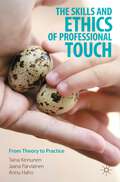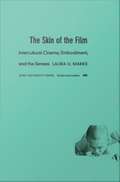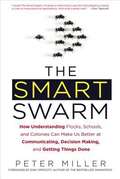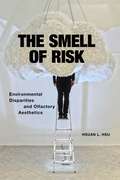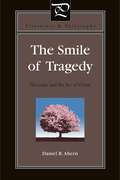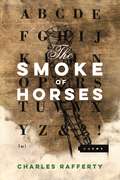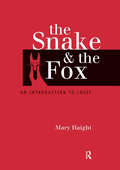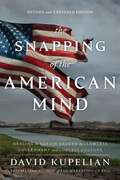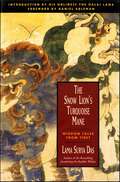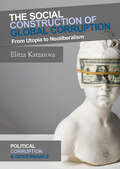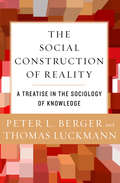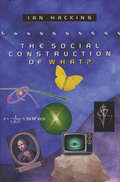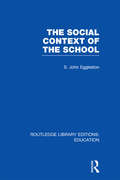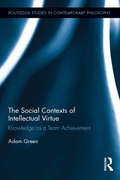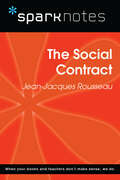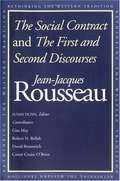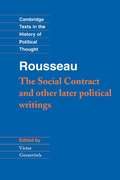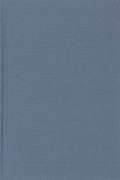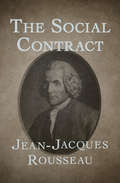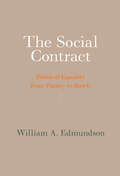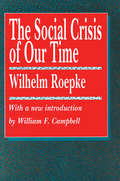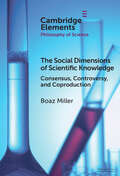- Table View
- List View
The Skills and Ethics of Professional Touch: From Theory to Practice
by Taina Kinnunen Jaana Parviainen Annu HahoThis book introduces readers to the ethical and goal-oriented functions of touch in professional practice. Touch is both an increasingly visible topic today and a core skill in many professions, especially in health, education and social work. This book combines helpful theoretical discussions and practical information, offering a balanced and culturally-informed introduction to an issue that both students and professionals often find difficult to navigate. Chapters discuss the various functions of touch and its uses, giving readers a deeper understanding of the potential of tactile work practices. The authors offer clear legal and ethical guidance to empower learners. They discuss key issues such as harmful touch and the increasing digitisation of patient work. Activities, case studies and further readings promote learning and help readers reflect on their own relationship to touch. This book will be an invaluable resource for students in undergraduate and graduate courses in healthcare, nursing, education and social work, and to practitioners looking for guidance on this topic.
The Skin of the Film: Intercultural Cinema, Embodiment, and the Senses
by Laura U. MarksMemories that evoke the physical awareness of touch, smell, and bodily presence can be vital links to home for people living in diaspora from their culture of origin. How can filmmakers working between cultures use cinema, a visual medium, to transmit that physical sense of place and culture? In The Skin of the Film Laura U. Marks offers an answer, building on the theories of Gilles Deleuze and others to explain how and why intercultural cinema represents embodied experience in a postcolonial, transnational world. Much of intercultural cinema, Marks argues, has its origin in silence, in the gaps left by recorded history. Filmmakers seeking to represent their native cultures have had to develop new forms of cinematic expression. Marks offers a theory of "haptic visuality"--a visuality that functions like the sense of touch by triggering physical memories of smell, touch, and taste--to explain the newfound ways in which intercultural cinema engages the viewer bodily to convey cultural experience and memory. Using close to two hundred examples of intercultural film and video, she shows how the image allows viewers to experience cinema as a physical and multisensory embodiment of culture, not just as a visual representation of experience. Finally, this book offers a guide to many hard-to-find works of independent film and video made by Third World diasporic filmmakers now living in the United States, Great Britain, and Canada. The Skin of the Film draws on phenomenology, postcolonial and feminist theory, anthropology, and cognitive science. It will be essential reading for those interested in film theory, experimental cinema, the experience of diaspora, and the role of the sensuous in culture.
The Smart Swarm
by Peter MillerWhat ants, bees, fish, and smart swarms can teach about communication, organization, and decision-making. The modern world may be obsessed with speed and productivity, but twenty-first-century humans actually have much to learn from the ancient instincts of swarmers. A fascinating new take on collective intelligence and its colorful manifestations in some of our most complex problems, The Smart Swarm introduces a compelling new understanding on solving our own problems relating to such topics as business, politics, and technology. This lively tour from National Geographic reporter Peter Miller introduces ant colonies that have been the inspiration for streamlining factory processes, telephone networks, and truck routes; termites, used in studies for climate-control solutions; schools of fish, on which the U.S. military modeled a team of robots; and many other examples of the wisdom to be gleaned about the behavior of crowds.
The Smell of Risk: Environmental Disparities and Olfactory Aesthetics
by Hsuan L. HsuA timely exploration of how odor seeps into structural inequality Our sense of smell is a uniquely visceral—and personal—form of experience. As Hsuan L. Hsu points out, smell has long been spurned by Western aesthetics as a lesser sense for its qualities of subjectivity, volatility, and materiality. But it is these very qualities that make olfaction a vital tool for sensing and staging environmental risk and inequality. Unlike the other senses, smell extends across space and reaches into our bodies. Hsu traces how writers, artists, and activists have deployed these embodied, biochemical qualities of smell in their efforts to critique and reshape modernity’s olfactory disparities.The Smell of Risk outlines the many ways that our differentiated atmospheres unevenly distribute environmental risk. Reading everything from nineteenth-century detective fiction and naturalist novels to contemporary performance art and memoir, Hsu takes up modernity’s differentiated atmospheres as a subject worth sniffing out. From the industrial revolution to current-day environmental crises, Hsu uses ecocriticism, geography, and critical race studies to, for example, explore Latinx communities exposed to freeway exhaust and pesticides, Asian diasporic artists’ response to racialized discourse about Asiatic odors, and the devastation settler colonialism has reaped on Indigenous smellscapes. In each instance, Hsu demonstrates the violence that air maintenance, control, and conditioning enacts on the poor and the marginalized. From nineteenth-century miasma theory theory to the synthetic chemicals that pervade twenty-first century air, Hsu takes smell at face value to offer an evocative retelling of urbanization, public health, and environmental violence.
The Smile of Tragedy: Nietzsche and the Art of Virtue (Literature and Philosophy #32)
by Daniel R. AhernIn The Smile of Tragedy, Daniel Ahern examines Nietzsche’s attitude toward what he called “the tragic age of the Greeks,” showing it to be the foundation not only for his attack upon the birth of philosophy during the Socratic era but also for his overall critique of Western culture. Through an interpretation of “Dionysian pessimism,” Ahern clarifies the ways in which Nietzsche sees ethics and aesthetics as inseparable and how their theoretical separation is at the root of Western nihilism. Ahern explains why Nietzsche, in creating this precursor to a new aesthetics, rejects Aristotle’s medicinal interpretation of tragic art and concentrates on Apollinian cruelty as a form of intoxication without which there can be no art. Ahern shows that Nietzsche saw the human body as the vessel through which virtue and art are possible, as the path to an interpretation of “selflessness,” as the means to determining an order of rank among human beings, and as the site where ethics and aesthetics coincide.
The Smile of Tragedy: Nietzsche and the Art of Virtue (Literature and Philosophy)
by Daniel R. AhernIn The Smile of Tragedy, Daniel Ahern examines Nietzsche’s attitude toward what he called “the tragic age of the Greeks,” showing it to be the foundation not only for his attack upon the birth of philosophy during the Socratic era but also for his overall critique of Western culture. Through an interpretation of “Dionysian pessimism,” Ahern clarifies the ways in which Nietzsche sees ethics and aesthetics as inseparable and how their theoretical separation is at the root of Western nihilism. Ahern explains why Nietzsche, in creating this precursor to a new aesthetics, rejects Aristotle’s medicinal interpretation of tragic art and concentrates on Apollinian cruelty as a form of intoxication without which there can be no art. Ahern shows that Nietzsche saw the human body as the vessel through which virtue and art are possible, as the path to an interpretation of “selflessness,” as the means to determining an order of rank among human beings, and as the site where ethics and aesthetics coincide.
The Smoke of Horses (American Poets Continuum)
by Charles RaffertyIn this fascinating new collection by longtime poet Charles Rafferty, evocative prose poems insert strange and mysterious twists into otherwise mundane middle-class scenarios. With wonderful intelligence and imagination, these compact, revelatory poems show us what is possible when we jettison accepted devices of thought for methods that are stranger, and much truer.Charles Rafferty is the author of six collections of poetry, one collection of stories, and two poetry chapbooks. He lives in Sandy Hook, CT, where he works at a technology research firm, directs the MFA program at Albertus Magnus College, and teaches in the Westport Writers' Workshop.
The Snake and the Fox: An Introduction to Logic
by Mary HaightThe Snake and the Fox is a highly imaginative and fun way to learn logic. Mary Haight's characters guide you through an elaborate tale of how logic works. This book features the Snake and the Fox, Granny, Gussie and the Newts, Ren^De Descartes and Miss Nightingale, along with a huge supporting cast of humans, devils and sausage machines.For anyone coming to logic for the first time, this is the best place to start. Mary Haight makes logic easy and fun - she asks the reader questions, and uses words instead of logic symbols with amusing pictures and characters to help them.This book teaches all the basics the reader needs to know about logic (how arguments work, sound, valid reasoning, truth tables, Venn diagrams etc) in a truly enjoyable and innovative way. Anyone teaching themselves logic, or learning it on a course is bound to benefit from this original and intriguing book.
The Snapping of the American Mind: Healing a Nation Broken by a Lawless Government and Godless Culture
by David KupelianAmerica the beautiful has become America the bizarre.REVISED AND EXPANDED EDITION! "A must-read if you really want to understand the world we live in and where it's headed." – SEAN HANNITY "David Kupelian's The Snapping of the American Mind chronicles the decline and fall of America and shows that it is no accident, but rather a direct result of progressive misrule?an eye-opening, scary and galvanizing book." – DINESH D'SOUZA "David Kupelian has once again given us a must-read in these times of political turbulence and cultural insanity." – PAUL KENGOR America the beautiful has become America the bizarre. Government promotes shockingly deranged policies while purposely turning citizens against each other, Christians are prosecuted as criminals, children "transition" to the opposite sex, crime skyrockets and 130 million Americans depend on mind-altering substances just to get through life. Turbocharged by the Obama presidency and continuing into the present day, long-coalescing forces of the political and cultural Left are bringing about their much-heralded "fundamental transformation of America." That much everyone knows. But this revolution is also causing a fundamental transformation of Americans in profoundly negative ways. In The Snapping of the American Mind, veteran journalist and bestselling author David Kupelian shows how the progressive Left which today dominates America's key institutions, from the news and entertainment media, to Big Tech, to education, to government itself is accomplishing much more than just enlarging government, redistributing wealth, and de-Christianizing the culture. With the Left's wild celebration of sexual anarchy, its intimidating culture of political correctness, and its incomprehension of the fundamental sacredness of human life, it is also, whether intentionally or not, promoting widespread dependency, debauchery, family breakdown, crime, corruption, addiction, despair, and suicide. Surveying this growing chaos in American society, Kupelian exposes both the utopian revolutionaries and their extraordinary methods that have turned America's most cherished values literally upside down to the point that madness is celebrated and normality demonized.
The Snow Lion's Turquoise Mane: Wisdom Tales from Tibet
by Surya DasTales of enlightenment that stem from the centuries-old oral Tibetan tradition, collected by one of the foremost American Buddhist teachers and scholars.Introduction by His Holiness the Dalai LamaThis remarkable book brings together more than 150 authentic Buddhist teaching tales from the Hidden Kingdom of Tibet—most never before translated into English. These captivating stories, legends and yarns—passed orally from teacher to student—capture the vibrant wisdom of an ancient and still-living oral tradition. Magical, whimsical, witty and ribald, The Snow Lion’s Turquoise Mane unfolds a luminous vision of a universe where basic goodness, harmony, and hope prevail.“This collection of more than 150 stories is the only such large anthology in the field of either Tibetan Buddhism or Himalayan folk and fairy tales, and provides unique reading material for both adults and children.” —Mu Soeng Sunim, Tricycle: The Buddhist Review“These wonderful stories of wandering yogis and yak herders echo with uncommon sense and deep wisdom.” —Rick Fields, author of How the Swans Came to the Lake
The Social Construction of Global Corruption: From Utopia to Neoliberalism (Political Corruption and Governance)
by Elitza KatzarovaThis book offers new ways of thinking about corruption by examining the two distinct ways in which policy approaches and discourse on corruption developed in the UN and the OECD. One of these approaches extrapolated transnational bribery as the main form of corrupt practices and advocated a limited scope offense, while the other approach tackled the broader structure of the global economic system and advocated curbing the increasing power of multinational corporations. Developing nations, in particular Chile, initiated and contributed much to these early debates, but the US-sponsored issue of transnational bribery came to dominate the international agenda. In the process, the ‘corrupt corporation’ was supplanted by the ‘corrupt politician’, the ‘corrupt public official’ and their international counterpart: the ‘corrupt country’. This book sheds light on these processes and the way in which they reconfigured our understanding of the state as an economic actor and the multinational corporation as a political actor.
The Social Construction of Reality: A Treatise in the Sociology of Knowledge
by Peter L. Berger Thomas LuckmannA watershed event in the field of sociology, this text introduced &“a major breakthrough in the sociology of knowledge and sociological theory generally&” (George Simpson, American Sociological Review). In this seminal book, Peter L. Berger and Thomas Luckmann examine how knowledge forms and how it is preserved and altered within a society. Unlike earlier theorists and philosophers, Berger and Luckmann go beyond intellectual history and focus on commonsense, everyday knowledge—the proverbs, morals, values, and beliefs shared among ordinary people. When first published in 1966, this systematic, theoretical treatise introduced the term social construction,effectively creating a new thought and transforming Western philosophy.
The Social Construction of What?
by Ian HackingLost in the raging debate over the validity of social construction is the question of what, precisely, is being constructed. Facts, gender, quarks, reality? Is it a person? An object? An idea? A theory? Each entails a different notion of social construction, Ian Hacking reminds us. His book explores an array of examples to reveal the deep issues underlying contentious accounts of reality. Especially troublesome in this dispute is the status of the natural sciences, and this is where Hacking finds some of his most telling cases, from the conflict between biological and social approaches to mental illness to vying accounts of current research in sedimentary geology. He looks at the issue of child abuse--very much a reality, though the idea of child abuse is a social product. He also cautiously examines the ways in which advanced research on new weapons influences not the content but the form of science. In conclusion, Hacking comments on the "culture wars" in anthropology, in particular a spat between leading ethnographers over Hawaii and Captain Cook. Written with generosity and gentle wit by one of our most distinguished philosophers of science, this wise book brings a much needed measure of clarity to current arguments about the nature of knowledge.
The Social Construction of What?
by Ian HackingLost in the raging debate over the validity of social construction is the question of what, precisely, is being constructed. Facts, gender, quarks, reality? Is it a person? An object? An idea? A theory? Each entails a different notion of social construction, Ian Hacking reminds us. His book explores an array of examples to reveal the deep issues underlying contentious accounts of reality. Especially troublesome in this dispute is the status of the natural sciences, and this is where Hacking finds some of his most telling cases, from the conflict between biological and social approaches to mental illness to vying accounts of current research in sedimentary geology. He looks at the issue of child abuse—very much a reality, though the idea of child abuse is a social product. He also cautiously examines the ways in which advanced research on new weapons influences not the content but the form of science. In conclusion, Hacking comments on the “culture wars” in anthropology, in particular a spat between leading ethnographers over Hawaii and Captain Cook. Written with generosity and gentle wit by one of our most distinguished philosophers of science, this wise book brings a much needed measure of clarity to current arguments about the nature of knowledge.
The Social Context of the School (Routledge Library Editions: Education)
by John EgglestonIn their appearance, schools often seem to be physically separated from their surroundings, cut off from the neighbouring houses and streets by high walls, by playgrounds or playing fields. Within the school, another world seems to exist, with a life of its own – its own routine, dress, rules and customs – which appears to have little relationship to the day-to-day life of the society outside. Yet despite these signs of separateness, we are becoming increasingly aware that a school’s surroundings, the local society in which it is set and whose children it educates, play an important part in determining what actually goes on in the classrooms and the playgrounds. This book looks at some of the factors in the local context of the schools and describes and analyses some of the often complex ways in which the schools interact with them.
The Social Contexts of Intellectual Virtue: Knowledge as a Team Achievement (Routledge Studies in Contemporary Philosophy)
by Adam GreenThis book reconceives virtue epistemology in light of the conviction that we are essentially social creatures. Virtue is normally thought of as something that allows individuals to accomplish things on their own. Although contemporary ethics is increasingly making room for an inherently social dimension in moral agency, intellectual virtues continue to be seen in terms of the computing potential of a brain taken by itself. Thinking in these terms, however, seriously misconstrues the way in which our individual flourishing hinges on our collective flourishing. Green’s account of virtue epistemology is based on the extended credit view, which conceives of knowledge as an achievement and broadens that focus to include team achievements in addition to individual ones. He argues that this view does a better job than alternatives of answering the many conceptual and empirical challenges for virtue epistemology that have been based on cases of testimony. The view also allows for a nuanced interaction with situationist psychology, dual processing models in cognitive science, and the extended mind literature in philosophy of mind. This framework provides a useful conceptual bridge between individual and group epistemology, and it has novel applications to the epistemology of disagreement, prejudice, and authority.
The Social Contract
by Jean-Jacques Rousseau Maurice CranstonWith the publication of The Social Contract in 1761, Jean-Jacques Rousseau took his place among the leading political philosophers of the Enlightenment. Like his contractarian predecessors (Thomas Hobbes and John Locke), Rousseau sought to ground his political theory in an understanding of human nature, which he believed to be basically good but corrupted by the conflicting interests within society. Here self-interest degenerated into a state of war from which humanity could only be extricated by the imposition of a contract. As a party to the compact, each individual would find his true interest served within the political expression of the community of man, or the "general will."
The Social Contract (SparkNotes Philosophy Guide)
by SparkNotesThe Social Contract (SparkNotes Philosophy Guide) Making the reading experience fun! SparkNotes Philosophy Guides are one-stop guides to the great works of philosophy–masterpieces that stand at the foundations of Western thought. Inside each Philosophy Guide you&’ll find insightful overviews of great philosophical works of the Western world.
The Social Contract And The First And Second Discourses
by Susan Dunn Robert N. Bellah Jean-Jacques Rousseau Conor Cruise O'Brien David Bromwich Gita MayJean-Jacques Rousseau's ideas about society, culture, and government are pivotal in the history of political thought. His works are as controversial as they are relevant today. This volume brings together three of Rousseau's most important political writings--The Social Contract and The First Discourse (Discourse on the Sciences and Arts) and The Second Discourse (Discourse on the Origin and Foundations of Inequality)--and presents essays by major scholars that shed light on the dimensions and implications of these texts. Susan Dunn's introductory essay underlines the unity of Rousseau's political thought and explains why his ideas influenced Jacobin revolutionaries in France but repelled American revolutionaries across the ocean. Gita May's essay discusses Rousseau as cultural critic. Robert N. Bellah explores Rousseau's attempt to resolve the tension between the individual's desire for freedom and the obligations that society imposes. David Bromwich analyzes Rousseau as a psychologist of the human self. And Conor Cruise O'Brien takes on the "noxious," "deranged" Rousseau, excoriated by Edmund Burke but admired by Robespierre and Thomas Jefferson. Written from different, even opposing perspectives, these lucid essays convey a sense of the vital and contentious debate surrounding Rousseau and his legacy. For this edition Susan Dunn has provided a new translation of the Discourse on the Sciences and Arts and has revised a previously published translation of The Social Contract.
The Social Contract and Other Later Political Writings
by Jean-Jacques Rousseau Quentin Skinner Raymond Geuss Victor GourevitchThe work of Jean-Jacques Rousseau is presented in two volumes, together forming the most comprehensive anthology of Rousseau's political writings in English. Volume II contains the later writings such as The Social Contract and a selection of Rousseau's letters on important aspects of his thought. The Social Contract has become Rousseau's most famous single work, but on publication was condemned by both the civil and the ecclesiastical authorities in France and Geneva. Rousseau fled and it is during this period that he wrote some of his autobiographical works as well as political essays such as On the Government of Poland. This 1997 volume, like its predecessor, contains a comprehensive introduction, chronology and guide to further reading, and will enable students to obtain a full understanding of the writings of one of the world's greatest thinkers.
The Social Contract, Discourse On The Virtue Most Necessary For A Hero, Political Fragments And Geneva Manuscript
by Jean-Jacques Rousseau Christopher Kelly Judith R. Bush Roger D. MastersContains the Social Contract, as well as the first English translation of Rousseau's early Discourse on the Virtue Most Necessary for a Hero, numerous previously untranslated political fragments, and the first draft of the Social Contract (the so-called Geneva Manuscript). By placing Rousseau's famous exposition of "political right" and the "general will" in the context of his preparatory drafts, the editors provide significant insight into the formation of one of the most important and influential works in Western political thought.
The Social Contract: Or, The Principles Of Political Rights (World Classics Ser.)
by Jean-Jacques RousseauThe eighteenth-century philosopher&’s landmark treatise against monarchy that inspired the French and American Revolutions. &“Man is born free, and everywhere he is in chains.&” With these stirring words, Jean-Jacques Rousseau begins The Social Contract—the first shot in a battle of ideas that would set the stage for the American War of Independence and the French Revolution. In the feverish days of the Enlightenment, Rousseau took aim squarely at the all-powerful French monarchy, proclaiming that no despot, no matter how powerful, had the right to terrorize his people. He laid out a plan for a new kind of government—an idea that was radical then, and remains so now. The Social Contract is a landmark document from a fascinating period in world history and an invaluable guide to the foundations of modern democracy. This ebook has been professionally proofread to ensure accuracy and readability on all devices.
The Social Contract: Political Equality from Putney to Rawls
by William A. EdmundsonWe are all parties to a social contract and obligated under it. Or is this mere fiction? How is such an agreement possible in a society riven by deep moral disagreement? William Edmundson explains the social-contract tradition from its beginnings in the English Revolution, through Hobbes, Locke, and Rousseau to its culmination in the work of John Rawls. The idea that legitimate government rests on the consent of free equals took shape in the seventeenth century and was developed in the eighteenth but fell into disuse in the nineteenth century even as democracy, toleration, and limited government gained ground. Edmundson shows how Rawls revived the idea of a social contract in the mid-twentieth century to secure these gains, as the then-dominant moral theories, such as utilitarianism, could not. The book also defends Rawls's conviction that political equality is integral to the idea of reciprocity at the heart of the tradition.
The Social Crisis of Our Time (The\library Of Conservative Thought Ser.)
by Arthur E. MorganRoepke's The Social Crisis of Our Time is a series of blasts against the malformations of economics: the Nazi and Communist forms of collectivism both come in for severe criticism. Roepke shows the process by which the Western liberal tradition itself makes possible these rebellions against open economic systems. The drive toward social welfare, full employment policies, and the state management of fiscal fluctuations all lead away from free societies no less than market economies.
The Social Dimensions of Scientific Knowledge: Consensus, Controversy, and Coproduction (Elements in the Philosophy of Science)
by Boaz MillerThis Element is about the social dimensions of scientific knowledge. The first section asks in what ways scientific knowledge is social. The second section develops a conception of scientific knowledge that accommodates the insights of the first section, and is consonant with mainstream thinking about knowledge in analytic epistemology. The third section asks under what conditions we can tell, in the real world, that a consensus in a scientific community amounts to shared scientific knowledge, as characterized in the second section, and how to deal with scientific dissent. The fourth section reviews the ways epistemic and social elements mutually interact to coproduce scientific knowledge. This Element engages with literature from philosophy of science and social epistemology, especially social epistemology of science, as well as Science, Technology, and Society (STS), and analytic epistemology. The Element focuses on themes and debates that date from the start of the second millennium.
